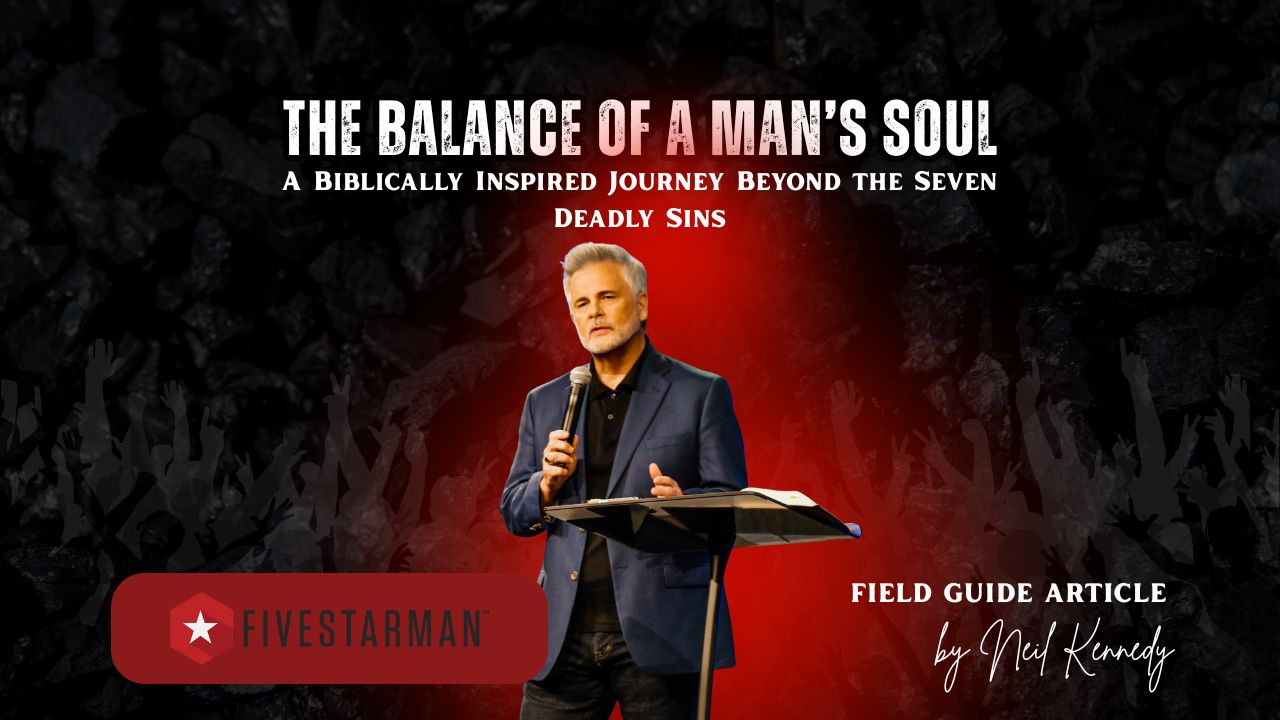The Balance of a Man’s Soul: A Biblically Inspired Journey Beyond the Seven Deadly Sins

In the tapestry of human existence, the struggle between vice and virtue is as old as time itself. The Seven Deadly Sins—lust, gluttony, greed, envy, wrath, sloth, and pride—have long been recognized as perilous pitfalls that can derail a life. Yet, as the Apostle Paul reminds us in Romans 7:15, “I do not understand what I do. For what I want to do I do not do, but what I hate I do.” The enemy of our souls, Satan, is cunning. He doesn’t care which side of the ditch we fall into—whether we succumb to the sins themselves or swing to their opposite extremes in a misguided attempt to avoid them. The true path to a flourishing life lies not in extremes but in the balance of the soul, where our deepest desires are aligned with God’s design.
The Seven Deadly Sins are not merely a list of moral failures; they are distortions of God-given desires. Each sin reflects a longing for something good—union, nourishment, generosity, admiration, justice, peace, and self-love—but twisted by the enemy’s deception. By understanding the root of these desires and seeking their fulfillment in Christ, we can find the balance that leads to a life of purpose, joy, and spiritual vitality.
1. Lust or the Avoidance of Intimacy: Seeking True Union
Lust is often misunderstood as mere physical desire, but at its core, it is a craving for connection gone astray. It seeks instant gratification, bypassing the vulnerability and commitment required for true intimacy. Yet, the opposite extreme—avoiding intimacy altogether—can be just as destructive, leading to isolation and emotional barrenness.
The Bible calls us to a higher standard. In 1 Corinthians 13:4-7, Paul describes love as patient, kind, and enduring. Lust distorts this into a selfish pursuit, while avoidance rejects the risk of love entirely. The balance lies in pursuing union—attachment and affection rooted in covenantal love. Jesus modeled this in His relationships, offering unconditional love while maintaining holiness. To find balance, seek relationships that reflect God’s heart: authentic, sacrificial, and grounded in mutual respect.
2. Gluttony or Excessive Control: Craving Nourishment
Gluttony is the overindulgence in food, drink, or consumption, but it stems from a deeper desire for nourishment, fulfillment, and satisfaction. On the opposite end, excessive control—obsessive dieting or rigid self-denial—can lead to a joyless existence, devoid of gratitude for God’s provision. Both extremes miss the mark of trusting God to meet our needs.
Philippians 4:19 assures us, “And my God will meet all your needs according to the riches of his glory in Christ Jesus.” Gluttony seeks to fill a spiritual void with physical excess, while excessive control reflects a lack of trust in God’s abundance. The balanced soul finds satisfaction in moderation, savoring God’s gifts while relying on His provision for true fulfillment. Practice gratitude for daily bread, and let your heart rest in the One who satisfies.
3. Greed or Scarcity: The Heart of Generosity
Greed is the relentless pursuit of more—wealth, possessions, or power—at the expense of others. Yet, its opposite, a scarcity mindset, can be equally damaging, hoarding resources out of fear and distrust. Both are rooted in a misunderstanding of God’s economy, where generosity is the key to abundance.
In 2 Corinthians 9:6, Paul writes, “Whoever sows sparingly will also reap sparingly, and whoever sows generously will also reap generously.” Greed misplaces generosity by hoarding what could bless others, while scarcity clings to fear instead of faith. The balanced soul gives freely, trusting God’s provision and finding joy in sharing. Reflect on how you can give—not just materially, but also in time, encouragement, and love—and watch how God multiplies your seed.
4. Envy or Idolization: Redirecting Admiration
Envy poisons the heart by coveting what others have, whether it’s their success, relationships, or gifts. Its opposite, idolizing others, places them on a pedestal, diminishing our own worth in God’s eyes. Both distort the love and admiration we are called to express.
Galatians 5:26 warns, “Let us not become conceited, provoking and envying each other.” Envy perverts admiration into resentment, while idolization elevates others above God’s unique design for us. The balanced soul celebrates others’ blessings while embracing its own identity in Christ. Instead of envying or idolizing, practice gratitude for God’s work in others and confidence in His purpose for you. You are fearfully and wonderfully made (Psalm 139:14).
5. Wrath or Passivity: Pursuing Justice with Grace
Wrath is the fire of uncontrolled anger, lashing out in destruction, while passivity avoids conflict altogether, allowing injustice to fester. Both extremes fail to reflect God’s heart for justice tempered with mercy.
James 1:19-20 instructs, “Everyone should be quick to listen, slow to speak and slow to become angry, because human anger does not produce the righteousness that God desires.” Wrath seeks vengeance, ignoring God’s call to forgive, while passivity neglects the courage to confront wrong. The balanced soul seeks justice with grace, addressing wrongs with love and standing firm in truth. Channel your passion into prayerful action, trusting God to bring ultimate justice.
6. Sloth or Performance: Embracing Restful Purpose
Sloth is often seen as laziness, but it’s deeper—a refusal to engage with life’s purpose, settling for apathy. Its opposite, performance, drives us to relentless busyness, seeking worth through achievement. Both miss the peace God offers.
In Matthew 11:28, Jesus invites, “Come to me, all you who are weary and burdened, and I will give you rest.” Sloth avoids God’s call to purposeful work, while performance seeks validation in endless striving. The balanced soul finds rest in Christ, working diligently from a place of peace rather than proving worth. Set boundaries, prioritize rest, and let your work flow from a heart aligned with God’s purpose.
7. Pride or Self-Hatred: The Power of Humble Confidence
Pride elevates self above others, while self-hatred diminishes the value God places on us. Both are distortions of self-love, which is not arrogance but a recognition of our worth as God’s creation.
Philippians 2:3 urges, “Do nothing out of selfish ambition or vain conceit. Rather, in humility value others above yourselves.” Pride poses as self-love but isolates us, while self-hatred rejects God’s image in us. The balanced soul embraces humble confidence, recognizing our value in Christ while honoring others. Daily affirm your identity as a beloved child of God, and let humility guide your interactions.
Finding the Balance in Christ
The Seven Deadly Sins and their extremes are traps set by the enemy to pull us away from God’s design. But as followers of Christ, we are not left to wander in the ditch. Jesus, the perfect embodiment of balance, shows us the way. He loved deeply without lust, enjoyed God’s provision without gluttony, gave generously without greed, admired without envy, pursued justice without wrath, rested without sloth, and walked in confidence without pride.
To find balance, we must root ourselves in Christ. John 15:5 reminds us, “I am the vine; you are the branches. If you remain in me and I in you, you will bear much fruit; apart from me you can do nothing.” Abide in Him through prayer, Scripture, and community. Reflect on your desires—are they pulling you toward sin or its extreme? Redirect them toward God’s truth.
Practical Steps to a Balanced Soul
- Self-Examination: Regularly assess your heart. Are you leaning toward a sin or its opposite? Confess and seek God’s guidance.
- Scripture Meditation: Anchor yourself in God’s Word. Memorize verses like those above to guide your desires.
- Community Accountability: Surround yourself with believers who encourage balance and challenge extremes.
- Gratitude Practice: Daily thank God for His provision, redirecting desires toward His goodness.
- Rest in Christ: Trust Jesus to meet your deepest needs, freeing you from the need to chase or avoid.
A Call to Rise
The enemy wants you stuck—either in the grip of sin or paralyzed by its opposite. But God calls you to rise, to walk the narrow path of balance where your soul finds its true home. As Psalm 23:3 declares, “He restores my soul. He guides me along the right paths for his name’s sake.” Let Christ restore your soul, guiding you to a life of union, nourishment, generosity, admiration, justice, peace, and humble confidence.
Will you take the first step today? Examine your heart, surrender your desires to God, and trust Him to lead you into the balance your soul craves. The journey is not easy, but the One who walks with you is faithful. Rise, and let your life reflect the beauty of a soul aligned with Christ.

